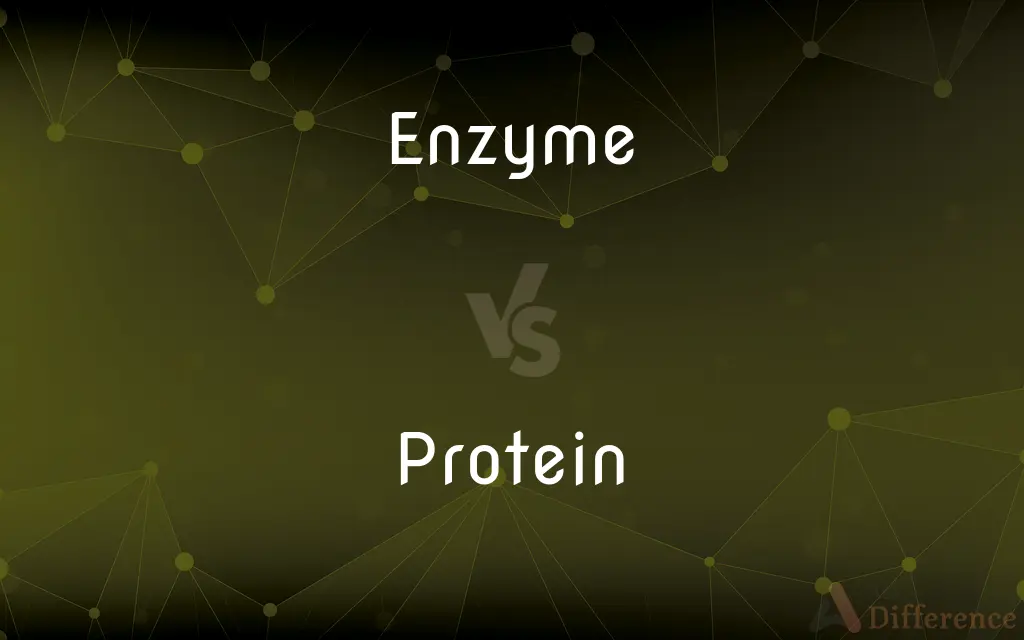Enzyme vs. Protein — What's the Difference?
By Urooj Arif & Maham Liaqat — Updated on March 24, 2024
Enzymes are proteins that catalyze biochemical reactions, essential for metabolism, whereas proteins have diverse functions including structural support, transport, and immune response.

Difference Between Enzyme and Protein
Table of Contents
ADVERTISEMENT
Key Differences
Enzymes are specialized proteins that act as catalysts to speed up biochemical reactions without being consumed in the process. They are critical for various metabolic processes, enabling life-sustaining chemical transformations to occur under the mild conditions of living cells. On the other hand, proteins are large, complex molecules made up of amino acids, serving a wide range of functions in the body. Besides being catalysts, proteins play roles in structural support, transport, signaling, immune responses, and movement.
The specificity of enzymes is one of their most remarkable features. Each enzyme is tailored to catalyze a specific reaction or type of reaction, ensuring metabolic pathways are precisely regulated. Whereas proteins, in general, can have broad functionalities beyond catalysis, including forming the structural framework of cells, acting as hormones, and defending the body against pathogens.
Enzymes exhibit a high degree of specificity, interacting with particular substrates to catalyze a specific reaction, often with incredible efficiency and selectivity. Proteins, while also capable of specific interactions, fulfill a broader spectrum of biological roles, from acting as molecular machines to participating in cellular signaling and structural organization.
The structure of enzymes, characterized by their active sites, is finely tuned to bind specific substrates and facilitate chemical reactions. In contrast, the diverse structures of proteins enable their wide range of functions, from the fibrous proteins providing mechanical support to globular proteins involved in transport and catalysis.
Enzymatic activity is highly sensitive to environmental conditions, such as pH and temperature, which can affect the rate of the catalyzed reactions. Proteins, while also sensitive to environmental conditions, may not directly catalyze reactions but are crucial for maintaining the cell's integrity, signaling, and other dynamic processes.
ADVERTISEMENT
Comparison Chart
Function
Catalyze biochemical reactions
Diverse, including structural, transport
Specificity
High, specific to substrates and reactions
Broad, varies with function
Role in Metabolism
Essential, speeds up reactions
Varied, not all are involved in metabolism
Structural Variety
Primarily globular
Includes globular, fibrous, and others
Sensitivity to Conditions
High, activity can be easily affected
Varied, some are more stable
Compare with Definitions
Enzyme
Sensitive to Conditions.
Pepsin works best in the acidic environment of the stomach.
Protein
Immune Response.
Antibodies identify and neutralize foreign objects like bacteria and viruses.
Enzyme
Efficient.
Carbonic anhydrase catalyzes the conversion of carbon dioxide and water to bicarbonate and protons very rapidly.
Protein
Structural.
Collagen provides strength and elasticity to skin and tendons.
Enzyme
Biological.
DNA polymerase helps in DNA replication.
Protein
Signaling.
Insulin regulates glucose levels in the blood.
Enzyme
Catalysts.
Amylase in saliva breaks down starch into sugar.
Protein
Catalytic.
Enzymes, which are a subset of proteins, catalyze biochemical reactions.
Enzyme
Specific.
Lactase specifically breaks down lactose into glucose and galactose.
Protein
Protein Definitions and Examples
Enzyme
Enzymes () are proteins that act as biological catalysts (biocatalysts). Catalysts accelerate chemical reactions.
Protein
Proteins are large biomolecules and macromolecules that are comprised of one or more long chains of amino acid residues. Proteins perform a vast array of functions within organisms, including catalysing metabolic reactions, DNA replication, responding to stimuli, providing structure to cells and organisms, and transporting molecules from one location to another.
Enzyme
Any of numerous compounds that are produced by living organisms and function as biochemical catalysts. Some enzymes are simple proteins, and others consist of a protein linked to one or more nonprotein groups.
Protein
Any of a group of complex organic macromolecules that contain carbon, hydrogen, oxygen, nitrogen, and usually sulfur and are composed of one or more chains of amino acids. Proteins are fundamental components of all living cells and include many substances, such as enzymes, hormones, and antibodies, that are necessary for the proper functioning of an organism. They are essential in the diet of animals for the growth and repair of tissue and can be obtained from foods such as meat, fish, eggs, milk, and legumes.
Enzyme
(biochemistry) A globular protein that catalyses a biological chemical reaction.
Protein
Any of numerous large, complex naturally-produced molecules composed of one or more long chains of amino acids, in which the amino acid groups are held together by peptide bonds.
Amino acid
Enzyme
(Christianity) leavened bread, as opposed to azyme
Protein
One of three major classes of food or source of food energy (4 kcal/gram) abundant in animal-derived foods i.e. meat and some vegetables, such as legumes.
Enzyme
A protein produced by a living organism, capable of catalyzing a chemical reaction. Almost all processes in living organisms require some form of enzyme to cause the reactions to occur at a rate sufficient to support life. There are a very wide variety of enzymes, each specifically catalyzing a different chemical reaction, the sum of which cause the bulk of the physiological changes observed as life processes. Enzymes, like most proteins, are synthesized by the protein-synthetic mechanism of the living cell, at special sites on ribosomes, using the genetic information in messenger RNA transcribed from the genetic instructions stored as nuleotide sequences in the DNA (or in some viruses, the RNA) of the genome. Some examples of enzymes are: pepsin, diastase, rennet, DNA polymerase, invertase, glucose oxidase, protease, and ribonuclease. There are many other types of enzyme.
Protein
A food rich in protein, often a meat or meat substitute.
Enzyme
Any of several complex proteins that are produced by cells and act as catalysts in specific biochemical reactions
Protein
In chemical analysis, the total nitrogenous material in vegetable or animal substances, obtained by multiplying the total nitrogen found by a factor, usually 6.25, assuming most proteids to contain approximately 16 per cent of nitrogen.
Protein
Any of a large group of nitrogenous organic compounds that are essential constituents of living cells; consist of polymers of amino acids; essential in the diet of animals for growth and for repair of tissues; can be obtained from meat and eggs and milk and legumes;
A diet high in protein
Common Curiosities
Are all enzymes proteins?
Yes, all enzymes are proteins, but not all proteins are enzymes.
What makes enzymes different from other proteins?
Enzymes are specialized for catalysis, whereas other proteins have a broader range of functions.
Are enzymes reusable?
Yes, enzymes can catalyze reactions repeatedly without being consumed.
Can environmental conditions affect enzyme activity?
Yes, factors like pH and temperature can significantly influence enzyme activity.
Can proteins function as enzymes?
Yes, many proteins function as enzymes, catalyzing biochemical reactions.
Do all proteins have a structural role?
Not all; while many proteins provide structural support, others serve in transport, signaling, or catalysis.
How do structural proteins differ from enzymes?
Structural proteins provide mechanical support, while enzymes catalyze chemical reactions.
How do enzymes speed up biochemical reactions?
Enzymes lower the activation energy required for reactions, making them proceed faster.
How is enzyme specificity determined?
By the unique shape and chemical properties of their active sites.
Are there proteins that don’t catalyze reactions?
Yes, many proteins function in roles other than catalysis, such as transport or signaling.
Can enzyme activity be regulated?
Yes, through mechanisms like allosteric regulation or substrate inhibition.
How are enzymes named?
Typically, by adding the suffix "-ase" to the substrate or the type of reaction they catalyze.
What role do transport proteins play?
They move molecules across cell membranes or throughout the body, like hemoglobin.
Do proteins contribute to the immune system?
Yes, antibodies, a type of protein, are key players in the immune response.
What is a cofactor in enzymatic reactions?
A non-protein chemical compound or metallic ion required for an enzyme's activity.
Share Your Discovery

Previous Comparison
Casevac vs. Medevac
Next Comparison
Khaki vs. TanAuthor Spotlight
Written by
Urooj ArifUrooj is a skilled content writer at Ask Difference, known for her exceptional ability to simplify complex topics into engaging and informative content. With a passion for research and a flair for clear, concise writing, she consistently delivers articles that resonate with our diverse audience.
Co-written by
Maham Liaqat













































